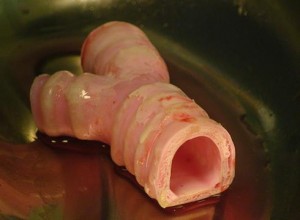
Welcome back to our mini-series on the Harvard Apparatus Regenerative Technology group of Harvard Biosciences. We’re here to explore the advancements made using the technologies by Harvard Biosciences. Pairing up with a world leading surgeon, four synthetic tracheal transplants have been conducted to date. The benefit of using a synthetic transplant is that the organ will essentially be off the shelf, there’s no waiting and matching a donor required. Thousands of people a year die waiting for transplants of various organs. Also, the mechanism for transplant of a synthetic organ as opposed to a donor organ doesn’t differ.
But why start with the trachea? The trachea structurally is a relatively simple organ. Without the bronchi the trachea is a hollow tube shaped organ with no complex nerve involvement. This makes the creation of a synthetic trachea relatively easier than other organs. Also, tracheal cancer is usually fatal since the diagnosis is normally too late for tumor removal. The trachea also does not involve contracting muscle movement.
The first transplant came from the decellularization of a donor trachea followed by the recellularization with the patient’s own stem cells. However, the next four transplants were made synthetically. The second and third transplants occurred on cancer patients. The organs were created using electro spinning. The first patient treated with a synthetic scaffold is still alive with his new trachea and living a normal life that without the trachea he wouldn’t have had. The second synthetic patient unfortunately passed away from complications from prior chemotherapy, but he was granted a second chance at a normal life with his new trachea.
The fourth and fifth surgeries were successfully performed recently on trauma patients as a part of a clinical trial in Russia.
With the technology provided by Harvard Apparatus, researchers are planning strategies that will provide people with a better quality of life after their transplant. But where can we go from here? Check back in for our last post on what’s next for the technology of Harvard Apparatus. Let us know what you think about the changes Harvard Apparatus is making in people’s lives @TRA360!
